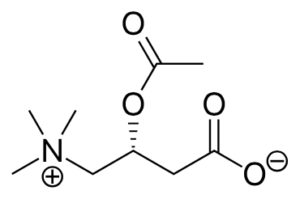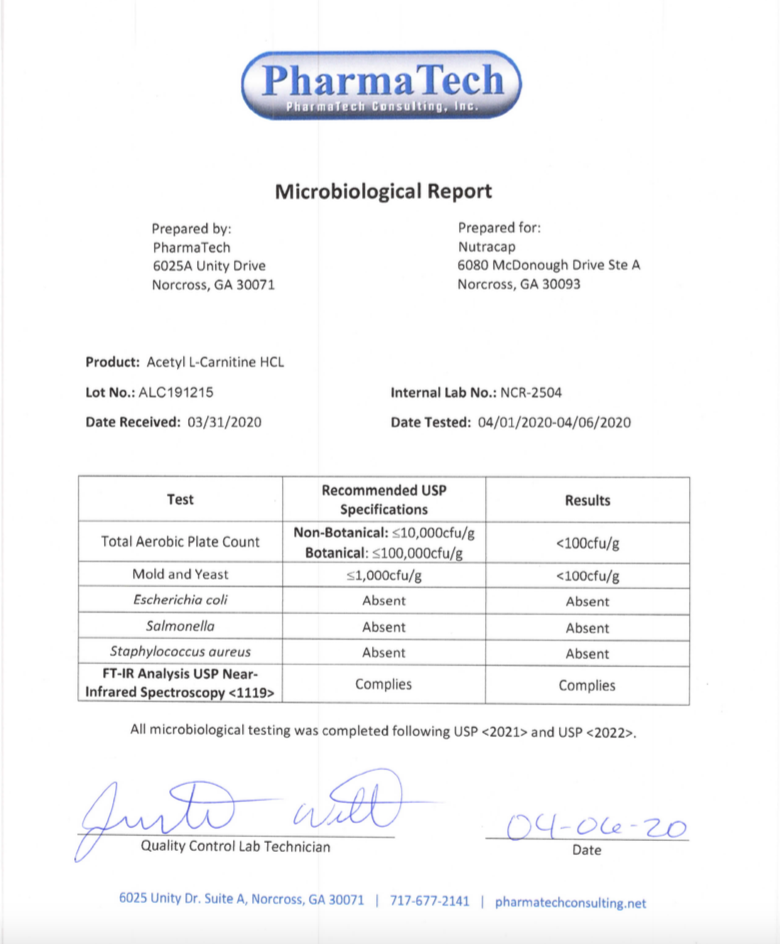
Origin: Naturally occurs in the body but can also be obtained through supplements
Also Known As:
ALCAR
ACL
Overview: Acetyl-L-Carnitine is an amino acid that naturally occurs within the body. This particular amino acid helps the body produce energy. Acetyl-L-Carnitine is used for a variety of purposes including age related memory loss, poor circulation in the brain, increasing low testosterone levels, helping increase the metabolism, and plays an important role for heart and brain function as well as muscle movement.
Common Dosage: The recommended dosage for Acetyl-L-Carnitine is 1000mg-2000mg daily.
Overview Description
Acetyl L-Carnitine is a naturally occurring substance that can be broken down in the blood by plasma esterases to carnitine which is used by the body to transport fatty acids into the mitochondria for breakdown.
Acetyl L-Carnitine is metabolized to acetyl-COA by the carnitine transferase reaction. It may also work as an alternative source for the citric-acid cycle, which may promote aerobic energy metabolism, reducing tissue acidosis. Acetyl-CoA (acetyl coenzyme A) is also important to the biosynthesis of acetylcholine.
In addition, continued oxidative metabolism provides Nicotinamide adenine dinucleotide phosphate (NADPH), the reducing power needed to convert oxidized glutathione to the reduced form capable of detoxifying H202 and other organic peroxides. L-carnitine is a nutrient and dietary supplement.
For your body to produce it in sufficient amounts, you also need plenty of vitamin C
Benefits and Uses
Acetyl L-carnitine may benefit the brain.
ALCARmay be beneficial in dementia. It may protect against oxidative stress indirectly by promoting oxidative metabolism and inhibiting tissue lactic acidosis, a condition that favors reactive oxygen species production, which may even protect your brain from cell damage.
May benefit heart health
Some studies demonstrate a potential for reducing blood pressure and the inflammatory process associated with heart disease
2 grams of acetyl-L-carnitine per day showed results in an almost 10-point drop in systolic blood pressure
Acetyl L-Carnitine are possibly linked to improvements in people with severe heart disorders, such as coronary heart disease and chronic heart failure
Forms and Sources
There are several forms of Carnitine that have different properties and outcomes.
Acetyl L-carnitine covered on this page is known for neuroprotective properties that may help protect the nervous system.
L-carnitine L-tartrate has shown evidence for exercise performance.
Propionyl-L-carnitine has shown pain relieving and antirheumatic properties, and it may also benefit heart health.
D-carnitine is a mirror image of L-carnitine; however, it is toxic to the body and inhibits the absorption of other forms of carnitine.
Side Effects and Interactions
For most people, 2 grams or less per day is relatively safe and free from any serious side effects.
L-carnitine supplements may raise your blood levels of trimethylamine-N-oxide (TMAO) over time. High levels of TMAO are linked to an increased risk of atherosclerosis — a disease which clogs your arteries
How to Label
Acetyl L–Carnitine as (Acetyl L-Carnitine HCL)
Research & Studies (References)
L-Carnitine and Acetyl-L-carnitine Roles and Neuroprotection in Developing Brain
There is compelling evidence from preclinical studies that L-carnitine and ALCAR can improve energy status, decrease oxidative stress and prevent subsequent cell death in models of adult, neonatal and pediatric brain injury. ALCAR can provide an acetyl moiety that can be oxidized for energy, used as a precursor for acetylcholine, or incorporated into glutamate, glutamine and GABA, or into lipids for myelination and cell growth.
https://pubmed.ncbi.nlm.nih.gov/28508995/
Kinetics, pharmacokinetics, and regulation of L-carnitine and acetyl-L-carnitine metabolism
https://pubmed.ncbi.nlm.nih.gov/15591001/
Acetyl-L-Carnitine in Dementia and Other Cognitive Disorders: A Critical Update
The underlying mechanisms may include restoring of cell membranes and synaptic functioning, enhancing cholinergic activity, promoting mitochondrial energy metabolism, protecting against toxins, and exerting neurotrophic effects. The effects of ALC on the gut-liver-brain axis seem to identify the category of patients in which the new insights contribute most to the mechanisms of action of ALC, likely being the liver metabolism and the improvement of hepatic detoxifying mechanisms the primary targets.
https://pubmed.ncbi.nlm.nih.gov/32408706/
Acetyl-L-Carnitine Supplementation and the Treatment of Depressive Symptoms: A Systematic Review and Meta-Analysis
ALC supplementation significantly decreases depressive symptoms compared with placebo/no intervention, while offering a comparable effect with that of established antidepressant agents with fewer adverse effects. Future large scale trials are required to confirm/refute these findings.
https://pubmed.ncbi.nlm.nih.gov/29076953/
Acetyl-l-carnitine deficiency in patients with major depressive disorder
https://pubmed.ncbi.nlm.nih.gov/30061399/
Effects of acetyl-L-carnitine in diabetic neuropathy and other geriatric disorders
ALC has demonstrated cytoprotective, antioxidant, and antiapoptotic effects in the nervous system. It exerts an analgesic action by reducing the concentration of glutamate in the synapses. It facilitates nerve regeneration and damage repair after primary trauma: its positive effects on metabolism promote the synthesis, fluidity, and functionality of neuronal membranes, increase protein synthesis, and improve the axonal transport of neurofilament proteins and tubulin. It also amplifies nerve growth factor responsiveness, an effect that is believed to enhance overall neurite growth. ALC has been proposed for the treatment of various neurological and psychiatric diseases, such as mood disorders and depression, dementias, Alzheimer’s disease, and Parkinson’s disease, because synaptic energy states and mitochondrial dysfunction are core factors in their pathogenesis.
https://pubmed.ncbi.nlm.nih.gov/28534301/
Antioxidant effect of acetyl-l-carnitine against cisplatin-induced cardiotoxicity
ALCAR might be a candidate protective agent for CDDP-induced cardiotoxicity. SOD-2, as a member of the oxidant system, should be evaluated in further studies as a biomarker of cardiotoxicity.
https://pubmed.ncbi.nlm.nih.gov/32865065/
A review of current evidence for acetyl-l-carnitine in the treatment of depression
ALC was also effective in improving depressive symptoms in patients with fibromyalgia and minimal hepatic encephalopathy. It was also found to be equally tolerable to PBO and better tolerable than fluoxetine and amisulpride. In conclusion, ALC may be potentially effective and tolerable next treatment option with novel action mechanisms for patients with depression, in particular older population and patients with comorbid medical conditions who are vulnerable to adverse events from antidepressants.
https://pubmed.ncbi.nlm.nih.gov/24607292/
Acetyl-L-carnitine for the treatment of chemotherapy-induced peripheral neuropathy: a short review
ALC has demonstrated efficacy and high tolerability in the treatment of neuropathies of various aetiologies, including chemotherapy-induced peripheral neuropathy (CIPN). In several experimental settings, the prophylactic administration of ALC prevented the occurrence of peripheral neurotoxicity commonly induced by chemotherapeutic agents. In animal models of CIPN, ALC administration promoted the recovery of nerve conduction velocity, restored the mechanical nociceptive threshold, and induced analgesia by up-regulating the expression of type-2 metabotropic glutamate receptors in dorsal root ganglia
https://pubmed.ncbi.nlm.nih.gov/17696592/
Acetyl-L-carnitine as a precursor of acetylcholine
These results provide further evidence for a role of mitochondrial carnitine acetyltransferase in facilitating transfer of acetyl groups across mitochondrial membranes, thus regulating the availability in the cytoplasm of acetyl-CoA, a substrate of choline acetyltransferase. They are also consistent with a possible utility of acetyl-L-carnitine in the treatment of age-related cholinergic deficits.
https://pubmed.ncbi.nlm.nih.gov/2215852/
Metabolic signature in nucleus accumbens for anti-depressant-like effects of acetyl-L-carnitine
High rank mice also showed reduced levels of several energy-related metabolites in the NAc that were counteracted by LAC treatment. Therefore, we reveal a metabolic signature in the NAc for antidepressant-like effects of LAC in vulnerable mice characterized by restoration of stress-induced neuroenergetics alterations and lipid function.
https://pubmed.ncbi.nlm.nih.gov/31922486/
The effects of L-carnitine L-tartrate supplementation on hormonal responses to resistance exercise and recovery
These data support the use of LCLT as a recovery supplement for hypoxic exercise and lend further insights into the hormonal mechanisms that may help to mediate quicker recovery.
https://pubmed.ncbi.nlm.nih.gov/12930169/
L-Carnitine L-tartrate supplementation favorably affects markers of recovery from exercise stress
The amount of muscle disruption from MRI scans during LCLT was 41-45% of the placebo area. These data indicate that LCLT supplementation is effective in assisting recovery from high-repetition squat exercise.















